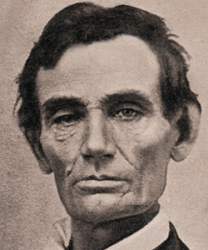Record Data
Source citation
Abraham Lincoln, Form Letter to Fillmore men, September 8, 1856, in Roy P. Basler, ed., The Collected Works of Abraham Lincoln (8 vols., New Brunswick, NJ: Rutgers University Press, 1953), 2: 528-530, http://quod.lib.umich.edu/l/lincoln/.
Recipient (to)
"Fillmore Men"
Type
Letter
Date Certainty
Exact
Transcriber
Transcription adapted from The Collected Works of Abraham Lincoln (1953), edited by Roy P. Basler
Adapted by Matthew Pinsker, Dickinson College
Transcription date
Transcription
The following text is presented here in complete form, as it originally appeared in print. Spelling and typographical errors have been preserved as in the original.
Springfield,
July 29. 1858
Hon. S. A. Douglas
Dear Sir
Yours of the 24th. in relation to an arrangement to divide time and address the same audiences, is received; and, in apology for not sooner replying, allow me to say that when I sat by you at dinner yesterday was not aware that you had answered my note, nor certainly, that my own note had been presented to you. An hour after I saw a copy of your answer in the Chicago Times; and, reaching home, I found the original awaiting me. Protesting that your insinuations of attempted unfairness on my part are unjust; and with the hope that you did not very considerately make them, I proceed to reply. To your statement that ``It has been suggested recently that an arrangement had been made to bring out a third candidate for the U. S. Senate who, with yourself, should canvass the state in opposition to me &c.'' I can only say that such suggestion must have been made by yourself; for certainly none such has been made by, or to me; or otherwise, to my knowledge. Surely you did not deliberately conclude, as you insinuate, that I was expecting to draw you into an arrangement, of terms to be agreed on by yourself, by which a third candidate, and my self, ``in concert, might be able to take the opening and closing speech in every case.''
As to your surprise that I did not sooner make the proposal to divide time with you, I can only say I made it as soon as I resolved to make it. I did not know but that such proposal would come from you; I waited respectfully to see. It may have been well known to you that you went to Springfield for the purpose of agreeing on the plan of campaign; but it was not so known to me. When your appointments were announced in the papers, extending only to the 21st. of August, I, for the first time, considered it certain that you would make no proposal to me; and then resolved, that if my friends concurred, I would make one to you. As soon thereafter as I could see and consult with friends satisfactorily, I did make the proposal. It did not occur to me that the proposed arrangement could derange your plan, after the latest of your appointments already made. After that, there was, before the election, largely over two months of clear time.
For you to say that we have already spoken at Chicago and Springfield, and that on both occasions I had the concluding speech, is hardly a fair statement. The truth rather is this. At Chicago, July 9th, you made a carefully prepared conclusion on my speech of June 16th.; twentyfour hours after I made a hasty conclusion on yours of the 9th.; you had six days to prepare, and concluded on me again at Bloomington on the 16th.; twentyfour hours after I concluded on you again at Springfield. In the mean time you had made another conclusion on me at Springfield, which I did not hear, and of the contents of which I knew nothing when I spoke; so that your speech made in day-light, and mine at night of the 17th. at Springfield were both made in perfect independence of each other. The dates of making all these speeches, will show, I think, that in the matter of time for preparation, the advantage has all been on your side; and that none of the external circumstances have stood to my advantage.
I agree to an arrangement for us to speak at the seven places you have named, and at your own times, provided you name the times at once, so that I, as well as you, can have to myself the time not covered by the arrangement. As to other details, I wish perfect reciprocity, and no more. I wish as much time as you, and that conclusions shall alternate. That is all.
Your obedient Servant
A. LINCOLN---
P.S. As matters now stand, I shall be at no more of your exclusive meetings; and for about a week from to-day a letter from you will reach me at Springfield. A. L.


